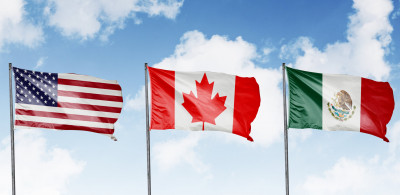2021 RENEWALS:
Previously under NAFTA, importers, exporters and/or producers would renew blanket certificates on a calendar year basis, starting on January 1 and expiring 12 months later, on December 31.When the new CUSMA free trade agreement between Canada, the United States and Mexico came into effect earlier this year on July 1, most importers, exporters and/or producers solicited or issued new blanket CUSMA certifications of origin, as prescribed by the new agreement in order to continue to claim the preferential tariff treatment on “originating” goods. Many of these blanket CUSMA certifications from back in July were filled out with an expiry date of December 31, 2020.
The preferential tariff treatment under the CUSMA can only be claimed on goods for which a current and valid certification of origin is on hand at time of importation. If your company uses blanket CUSMA certifications of origin, you should make sure that you have the renewed certifications for 2021 on file before your previous certifications are set to expire. Without updated CUSMA certifications on file, importers could face higher customs duty rates as well as other customs fees (e.g. MPF on U.S. entries) on their imported/exported goods.
Keep in mind that the CUSMA certification of origin is a legal trading document and should be validated and signed by an individual with the appropriate knowledge of the goods being certified and authority to sign on behalf of the company.
Only goods produced in Canada, the United States or Mexico which have undergone a proper CUSMA origin analysis (effected by the producer of the goods) and that have been determined to be “originating” goods in accordance with the appropriate product-specific CUSMA rule of origin can be certified on a CUSMA certification of origin.
IMPORTER’S TASKS:
- Solicit new CUSMA certifications of origin from suppliers (either blanket or single shipment).
- Verify certifications to ensure they include all minimum data elements required under CUSMA.
- Ensure your customs brokers receive copies of the new certifications, for entry processing.
- Exercise due diligence and reasonable care to ensure your suppliers understand the changes and their obligations (see Exporters and Producers).
EXPORTER’S TASKS:
- If you are the exporter but not the producer, solicit new CUSMA certifications from producers.
- You will need to issue new certifications of origin to clients (importers), based on CUSMA certification criteria.
- Goods must qualify according to the “rules of origin” set out in the CUSMA.
- Only goods that originate according to the CUSMA can be certified.
PRODUCER’S TASKS:
- If you are the producer but not the exporter, your exporter-clients will likely solicit new CUSMA certifications from you.
- As a producer, you must solicit back-up CUSMA certifications or other written confirmations for all “originating” materials or components that you sourced from CA, US or MX suppliers.
- Carry out origin analysis on your manufactured goods, based on the “rules of origin” set out in CUSMA.
- Only goods that originate according to CUSMA can be certified and origin preference claimed.
- If necessary, apply for an origin ruling with CBSA or U.S. CBP.
RECORDKEEPING:
Importers, exporters and producers are required to keep records supporting their CUSMA claims for up to five years.IMPORTER:
- Copies of all CUSMA certifications received from vendors for imported goods
- Copies of all CUSMA certifications issued to clients for exported goods
- If applicable, copies of all back-up CUSMA certifications received from producer(s)
- Copies of all CUSMA certifications issued to clients for goods produced
- All data and records demonstrating that the goods qualify as “originating” under CUSMA
- Documented CUSMA origin analysis based on Bill of Material (BOM) data
- Copies of all CUSMA certifications received from North American suppliers for “originating” components and materials used in production of the finished good
CUSMA LIABILITY:
- Exporters and manufacturers/producers are responsible for ensuring the goods they certify are “originating” per the rules of origin set out in CUSMA.
- However, it will always be the importer who will pay the costs (e.g. reassessment of duty, interest and penalties) if the origin preference claim is overturned by Customs in the importing country.
- Importers should include an indemnification clause on purchase agreements (e.g. P.O., contract, sales agreement) to hold their foreign vendors liable for invalid or incorrect CUSMA Certifications of Origin. Such indemnification should include a covenant from the foreign vendor, whether the exporter or the producer, that it will cooperate in the event of a CUSMA origin verification (audit) undertaken by Customs in the importing country.
- Importers should not blindly accept CUSMA Certifications. Importers should be proactive and verify the validity of CUSMA Certifications received from their vendors:
- Is the certification properly completed with all minimum data?
- Is the certification done by someone who has knowledge of the product being certified, and does that person have authority to sign on behalf of the company?
- Has the producer conducted a proper CUSMA origin analysis before certifying the goods?
- Does the exporter/producer who issued the certification keep adequate records for five years?
W2C offers various consulting services related to free trade agreements:
- Training courses and seminars on management of origin preferences
- Determining correct HS Tariff Classifications (needed to ascertain applicable rules of origin)
- Carrying out origin analysis (NAFTA, CUSMA, CETA, CPTPP, etc.)
- Duty recovery and post-entry corrections
- Audit support during CBSA or CBP origin audits
- Requests for Advance Rulings (CBSA) or Binding Rulings (CBP) on origin
For more information, contact your W2C representative today.

